周三上课3句子成分
Unit3语法知识清单-高中英语人教版选择性

选修一 Unit 3 语法点动词-ing 形式作主语一、关于动词-ing形式的基本情况1、动词-ing形式是动词的一种非谓语形式,包括现在分词和动名词两种。
动词-ing形式在句中的语法作用:动名词在句中作主语、宾语、表语和定语,现在分词在句中作状语、宾语补足语和定语。
二、动词-ing形式作主语1、动词-ing形式作主语动词-ing形式作主语,往往表示经常性、习惯性的动作,通常置于句首。
动名词作主语时,谓语动词用单数。
2、形式主语it代替动词-ing形式作主语。
此类句式常见的有:3、动词-ing 形式和 to do作主语时的区别。
动词-ing形式和to do 都可以作主语。
动词-ing 形式作主语表示比较抽象的一般行为,to do 作主语往往表示具体的或一次性的动作。
三、动词-ing的复合结构作主语(1)作主语的动词-ing的复合结构的肯定形式为:形容词性物主代词/名词的所有格+doing.…。
(2)作主语的动词-ing的复合结构的否定形式为:形容词性物主代词/名词的所有格+not doing…。
课文重点句1、Even though the sun is brightly shining, telling whether it ismorning or night is impossible.尽管阳光灿烂,也无法分辨是早晨还是晚上。
2、Following the reindeer(驯鹿) were the Sami people, who made thisterritory(领地,领土) their home.在驯鹿之后来的是萨米人,他们在这片土地上安家落户。
Who 引导非限制性定语从句3、 If today is anything like yesterday, it will be full of sweat andhard work as I hike over this difficult land to my destination on the other side of the valley.如果今天和昨天差不多,那将会充满汗水和艰辛,因为我要徒步跨越这片地形艰险的土地,到达峡谷另一端的目的地。
Lesson3语法
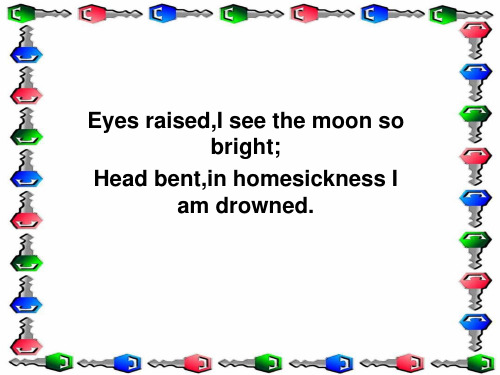
• 5.They had a class-meeting yesterday and____. • A. so did we B. so had we • C.we did so D. we had so • 6.At the top of hill____. • A. Does a weather station stand • B. stands a TV tower • C. a weather station stands • D. a TV tower lies • 7.Only by this means____ the lights wen out. • A.You can solve B. you will settle • C. do you answer D. can you solve
• 1.Our homework having been finished, had we went to play football. being • 2.The meeting was over, he went back home. permiting • 3.Time permits, we shall visit the zoo. permiting • 4.Weater permits, we shall go swimmming. rolling • 5.She stood there, tears rolled down her cheeks.
• This done, we went home. • 工作完成后,我们才回家。 工作完成后,我们才回家。 • He came into the room, his ears red with cold. • 他回到了房子里,耳朵冻红了。 他回到了房子里,耳朵冻红了。 • He came out of the library, a large book under his arm. • 他夹着本厚书,走出了图书馆 他夹着本厚书,
人教PEP六年级英语上册 Unit3_语法归纳
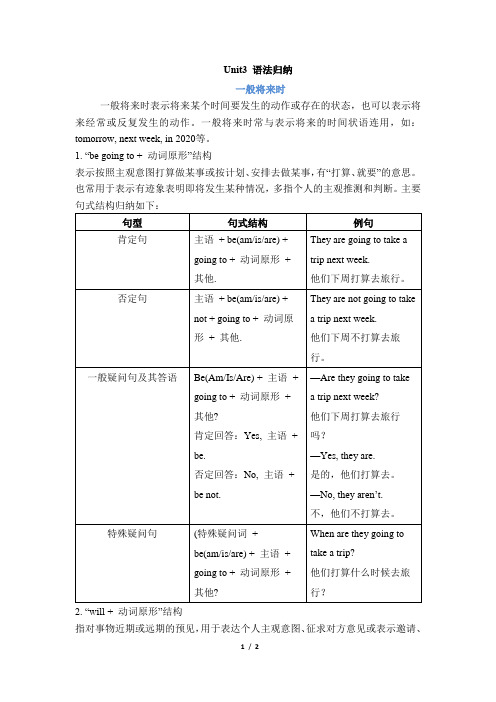
Unit3 语法归纳
一般将来时
一般将来时表示将来某个时间要发生的动作或存在的状态,也可以表示将来经常或反复发生的动作。
一般将来时常与表示将来的时间状语连用,如:tomorrow, next week, in 2020等。
1. “be going to + 动词原形”结构
表示按照主观意图打算做某事或按计划、安排去做某事,有“打算、就要”的意思。
也常用于表示有迹象表明即将发生某种情况,多指个人的主观推测和判断。
主要
2. “will + 动词原形”结构
指对事物近期或远期的预见,用于表达个人主观意图、征求对方意见或表示邀请、。
语文语法知识:句子成分划分
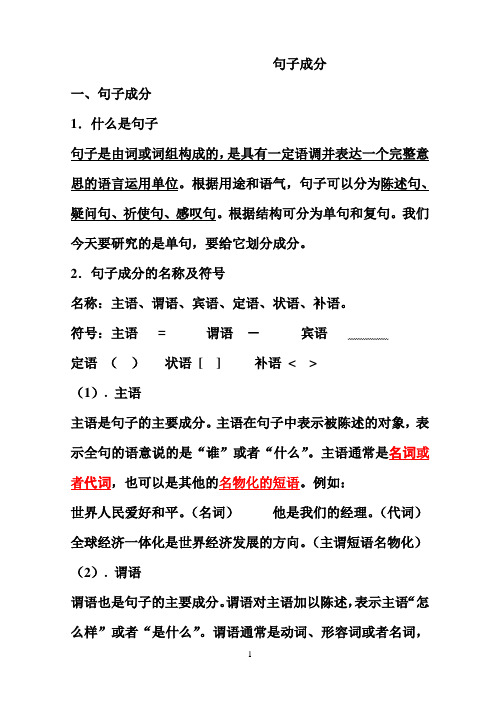
句子成分一、句子成分1.什么是句子句子是由词或词组构成的,是具有一定语调并表达一个完整意思的语言运用单位。
根据用途和语气,句子可以分为陈述句、疑问句、祈使句、感叹句。
根据结构可分为单句和复句。
我们今天要研究的是单句,要给它划分成分。
2.句子成分的名称及符号名称:主语、谓语、宾语、定语、状语、补语。
符号:主语= 谓语-宾语定语()状语[ ] 补语< >(1). 主语主语是句子的主要成分。
主语在句子中表示被陈述的对象,表示全句的语意说的是“谁”或者“什么”。
主语通常是名词或者代词,也可以是其他的名物化的短语。
例如:世界人民爱好和平。
(名词)他是我们的经理。
(代词)全球经济一体化是世界经济发展的方向。
(主谓短语名物化)(2). 谓语谓语也是句子的主要成分。
谓语对主语加以陈述,表示主语“怎么样”或者“是什么”。
谓语通常是动词、形容词或者名词,有时偏正关系的短语也可以做谓语。
溪水涨起来了。
(动词)花儿红艳艳。
(形容词)今天星期三。
(名词)这张桌子三条腿。
(偏正短语)(3.)宾语宾语是动词的连带成分,表示动作、行为所涉及的对象。
常由名词、代词跟在动词后边,或者是名词、代词借助介词用在动词前边;另外表示开始、停止的动词和表示活动的动词短语可以做宾语(动词名物化)。
例如:他吃桃。
(名词)人们理解他。
(代词)她喜欢跳舞。
(动词短语名物化)(4). 定语修饰或者限制名词的成分叫做定语。
定语表示人或事物的性状、数量、所属等。
通常是形容词、数量词、名词、代词,用在名词前边。
定语后常用助词“的”。
例如:(红色)的花。
(形容词)(四双)袜子。
(数量词)他今天穿了件(呢子)大衣。
(名词)这是(我)的意见。
(代词)(5).状语修饰或者限制形容词的成分是状语。
状语表示动作的状态、方式、时间、处所、程度等。
通常是形容词、副词、数量词、表示处所或者时间的名词、介词结构,用在动词或形容词前边。
状语后常用助词“地”。
例如:你〔快〕走。
[现代汉语语法句子成分]现代汉语语法基础知识——单句类型及句子成分
![[现代汉语语法句子成分]现代汉语语法基础知识——单句类型及句子成分](https://img.taocdn.com/s3/m/19c5c4ab71fe910ef12df8d2.png)
篇一:现代汉语语法基础知识——单句类型及句子成分讲究复习效益,提高高考成绩现代汉语语法基础知识编撰:罗志辉第五节单句类型及句子成分一、句子句子是由词或短语构成的语言的基本运用单位。从结构上看,短语和句子同属句法结构:不带语气的句法结构是短语,带上语气的句法结构是句子。但短语与句子毕竟不是一回事。短语是材料单位、静态单位,句子是表达单位、动态单位。句子有自己的结构类型和语气类型,还有特殊成分。二、句子的类型1.从结构上分,句子可以分为单句和复句。单句由1个短语或1个词构成,复句由2个或2个以上的分句构成。我们一般所说的“句子”,指的是“单句”。单句又可以分为主谓句和非主谓句。如“明天晴天。”“这里风景优美。”“他来了。”是主谓句。“好!”“严禁吸烟。”是非主谓句。2.从语气上分,句子可以分为陈述句、疑问句、祈使句和感叹句。例如:A.理想是前进的灯塔。B.你上哪儿?C.请勿吸烟!D.多么可爱的秋色啊!从结构上对句子划分得出的类型叫句型,从语气上对句子的划分得出的类型叫句类。句型和句类是对句子作不同角度的划分得出的类型,因此,1个句子总是兼属这2种性质不同的类型。例如:A.理想是前进的灯塔。B.你上哪儿?C.请勿吸烟!D.多么可爱的秋色啊!E.你真了不起!三、单句句型单句可以分为主谓句和非主谓句。主谓句由主谓结构构成的句子叫主谓句。1.名词性谓语句由名词性词语充当谓语的句子叫名词性谓语句。名词单独充当谓语的情况较少,较多的情况是名词性偏正结构。例如:A.今天阴天。B.明天中秋。C.鲁迅浙江人。D.赣,江西省的简称。E.猪肉两斤半。F.他2个儿子。G.这部小说去年出版的。H.他圆圆的脸,大大的眼睛。I.老李好眼力。2.动词性谓语句由动词性词语充当谓语的句子叫动词性谓语句。例如:A.他去了吗?B.我喜欢这绚丽的秋色。C.她急忙告诉我去月亮湖就在这里上岸。D.他讲得很清楚。E.水生昨天从北京出发
九年级英语人教版unit3知识点总结
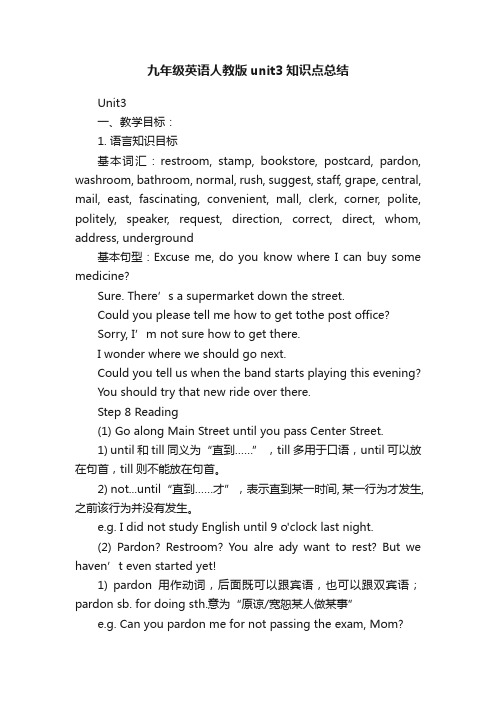
九年级英语人教版unit3知识点总结Unit3一、教学目标:1. 语言知识目标基本词汇:restroom, stamp, bookstore, postcard, pardon, washroom, bathroom, normal, rush, suggest, staff, grape, central, mail, east, fascinating, convenient, mall, clerk, corner, polite, politely, speaker, request, direction, correct, direct, whom, address, underground基本句型:Excuse me, do you know where I can buy some medicine?Sure. There’s a supermarket down the street.Could you please tell me how to get tothe post office?Sorry, I’m not sure how to get there.I wonder where we should go next.Could you tell us when the band starts playing this evening?You should try that new ride over there.Step 8 Reading(1) Go along Main Street until you pass Center Street.1) until和till同义为“直到……” ,till多用于口语,until可以放在句首,till则不能放在句首。
2) not...until“直到……才”,表示直到某一时间, 某一行为才发生, 之前该行为并没有发生。
e.g. I did not study English until 9 o'clock last night.(2) Pardon? Restroom? You alre ady want to rest? But we haven’t even sta rted yet!1) pardon用作动词,后面既可以跟宾语,也可以跟双宾语;pardon sb. for doing sth.意为“原谅/宽恕某人做某事”e.g. Can you pardon me for not passing the exam, Mom?2) 在没有听懂对方的话,请对方重复一下时也可说pardon。
人教版(新教材)必修第三册unit3重点句子总结和语法讲解

UNIT 3 DIVERSE CULTURES本单元重点句子1.I really like that paper folding book,and my son likes that paper folding book,too.我真的很喜欢那本折纸书,我儿子也喜欢那本折纸书。
2.Find out which words have been left out.找出省略了哪些词。
3.it is even mentioned in the oldest collection of Chinese poetry.……甚至在中国最古老的诗集中也提到了它。
4.Historically,Chinese immigrants settled in the area during the railroad construction and gold rush period.历史上,中国移民在铁路建设和淘金热时期定居在该地区。
5.There is Chinese food to suit everyone’s taste,with traditional dishes from all over China.有适合每个人口味的中餐,有来自中国各地的传统菜肴。
6.Does the city/town introduction contain all the important information?城市的介绍包括所有重要的信息吗?7.I have to admit that it definitely feels good to be back in the city again.我不得不承认,再次回到城市的感觉很好。
8..a city that was able to rebuild itself after the earthquake that occurred in 1906.……一个在1906年地震后能够重建自己的城市。
初中英语语法——句子成分精讲
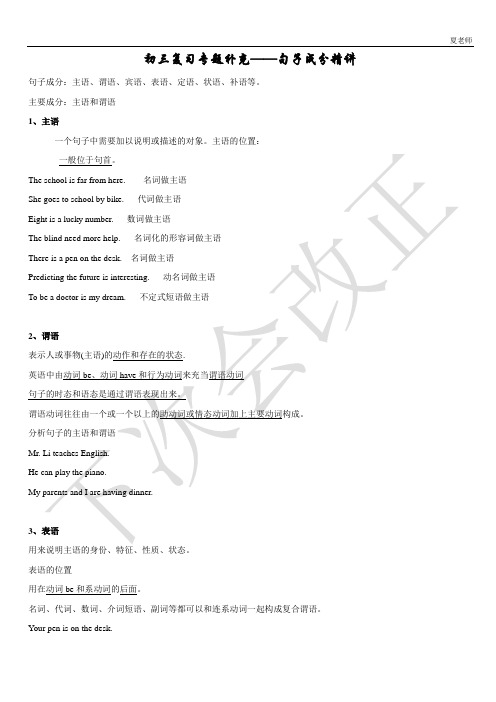
初三复习专题补充——句子成分精讲句子成分:主语、谓语、宾语、表语、定语、状语、补语等。
主要成分:主语和谓语1、主语一个句子中需要加以说明或描述的对象。
主语的位置:用来说明主语的身份、特征、性质、状态。
表语的位置用在动词be和系动词的后面。
名词、代词、数词、介词短语、副词等都可以和连系动词一起构成复合谓语。
Your pen is on the desk.He got very angry.My dream is to have a robot.常见的系动词1. be动词2. 与感觉有关的动词look, sound, smell, taste, feel 等3. 表示状态变化的动词,意为“变得” “变成” 如get, grow, turn等上述两类词作连系动词时要用形容词作表语,千万不能用副词。
4、宾语是动作的对象或承受者。
跟在动词或者介词之后及物动词:直接接宾语的谓语动词.不及物动词:不能直接带宾语的谓语动词.宾语可由名词、代词、数词、不定式、动名词、从句构成.I saw a plane in the sky just now.名词做宾语I want three.数词做宾语I like going shopping.动名词做宾语We think predicting the future is hard.宾语从句5、宾语补足语(宾补)有些及物动词除了要有一个宾语之外, 还须加上一个补足语。
如果没有补足语(宾补), 有时候句子的意思就不完整。
充当宾补的有:1. 形容词作宾语补足语The sun keeps us warm.2. 介词短语作宾语补足语:I found her in the room.3. 副词作宾语补足语。
Please let him in.4. 名词作宾语补足语。
We made him monitor of the class.5. 动词不定式和分词也能用作宾语补足语。
I asked him to come.6、定语定语修饰名词或代词(即在汉语里的……的)1. 形容词作定语(一般放在被修饰语之前,修饰不定代词时放在后面)They have a clever son.I have something important to tell you.2. 名词作定语:Is it a color film?名词作定语一般用单数形式, 如:school bus,ticket office, paper flowers但也有例外,如: sports meeting, clothes shopman 和woman修饰的名词如果是复数,它们总以复数的形式作定语,如:men drivers , women doctors3. 代词作定语:This song is better than that one.4. 数词作定语:There are only thirty students in our class.带有数字的复合形容词.当复合形容词用连字号连接时,其中的名词要用单数形式.a two-day holiday a three-year-old boy5. 副词作定语(放在被修饰词之后):Do you know the young man over there?6. 介词短语作定语(放在被修饰词之后):The students in our class like swimming.7、状语修饰动词,形容词或副词,有的修饰全句, 用以说明地点, 时间, 方式, 程度, 原因, 目的, 结果, 条件, 让步等.1. 副词作状语:The old man is walking slowly.表方式The boy is very clever.表程度2. 介词短语作状语:I have lived in Shanghai for five years.表时间3. 不定式作状语I come here to see you.表目的4. 现在分词作状语The teacher came in, holding a book in his hand. 表方式5. 状语从句We’ll go shopping if it doesn’t rain tomorrow.。
- 1、下载文档前请自行甄别文档内容的完整性,平台不提供额外的编辑、内容补充、找答案等附加服务。
- 2、"仅部分预览"的文档,不可在线预览部分如存在完整性等问题,可反馈申请退款(可完整预览的文档不适用该条件!)。
- 3、如文档侵犯您的权益,请联系客服反馈,我们会尽快为您处理(人工客服工作时间:9:00-18:30)。
句子成分(主、谓、宾、定、状、补、表)1. 主语(S.)e.g.The car is running fast. We are students. One of my classmates is from Shanghai.It's bad manners to spit in public. Eating too much is bad for your health.2.谓语(V.)e.g.He works in a factory.___________ I felt cold.___________How can I get to the station?___________ Do you speak English?___________They are working in a field.______________ I will wait for you.____________3.宾语(O.)是及物动词所涉及的对象,一般由名词、代词、不定式及动名词等充当。
E.g. He is doing his homework.They did nothing this morning.She wants to go home. We enjoy playing football.考点:1)有的动词可接双宾语,间接宾语指人,直接宾语指物。
这类动词常见的有:give/_______________________________________________sb. sth.等。
2)有的动词常用不定式作宾语,这类动词有:want/ ___________________________________________________________________________________等。
如:3)有的动词一般只用动名词作宾语,这类动词有:enjoy/__________________________________________________________________等。
4)be + adj. + to do…5)有的动词后接不定式与动名词含义不同。
a)forget/ remember to do表示“未发生的动作”,forget/ remember doing表示“已完成的动作”。
e.g. I forgot ____________(return) the book to him. He is reading it now.Don't forget __________(come) here earlier tomorrow.b)stop to do停下(原来的事)去做另一件事,stop doing停止做某事。
如:The students stopped____________(talk) when the teacher came in.I stopped _______(have) a rest after the tiring task.4.定语:用于修饰名词或代词,一般由形容词、名词、数词、不定式等充当。
What a beautiful kite it is! She is a chemistry teacher.There are two students in the classroom. We have something to do tomorrow.The man in blue is my brother.考点:1)adj. + n. 。
a_________(严肃的) man the ___________(便利的)traffic 2)复合不定代词+ adj. e.g. Is there __________________(一些特别的) in today’s newspaper?3) n.+ to do (+介词) e.g. I have homework ___________(do). I need a friend _________(交谈)He wants something____________(喝). We need a pen ______________(写).4)过去分词作后置定语:一个叫John的人____________________; 一本他写的书_________ 5.状语:用于修饰动词、形容词、副词或全句,一般由副词、介词短语、不定式短语或从句充当。
单个副词作状语一般放在被修饰词之前,短语或从句放在句首或句末。
如:Thank you very much. I get up at five in the morning.He is studying hard in order to catch up with others.We were having breakfast when the telephone rang.考点:1)enough作状语只能放在形容词、副词之_____。
He is __________ to go to school.(足够大)2)行为v. + adv. E.g. We should listen _______________(认真).3) also, still等词的位置:____________________________________;e.g. 我也能说法语。
__________________________________________我很喜欢音乐。
_____________________________________________4)to do作状语e.g. The soldier jumped into the river ____________(救) the boy.We should do everything we can_____________________(保护) the environment.We study hard _____________________________________(为了) get good scores.6.表语:用于说明主语的身份、特征或感受,一般由名词、数词、形容词、分词等充当。
常用的连系动词有:一“好像”_____________, 二“保持”_____________________,三“be”__________,四“变得”_________________________________,五“……起来”____________________________ e.g. They are workers. Two and three is five. The story is very interesting.She is at home.I feel terrible.The dish tastes delicious.考点:1)Linking v. + adj.e.g. It sounds ___________(礼貌) to say “excuse me ” when asking for help.The food cooked by him smells ______________and it sells ________________(好).2) to do作表语 e.g.My job is to teach English.7.宾语补足语:用于补充说明宾语的动作,一般位于宾语之后,宾语与宾语补足语一起构成复合宾语。
“宾补”一般由不定式短语、分词、名词、形容词等充当。
如:We elected him monitor.I found it difficult to learn English well.The doctor told me to do more exercise. He is going to have his hair cut.They saw a bird flying in the sky.考点:1)a. _________________________________________________________________________ ________________________________________________________sb. to do;b. _________________________________________sb. do;c. __________________________________________________sb. doing2) find / think it+ adj. + to do3) keep/ make + 宾语+ adj.e.g. After-school activities can keep us ________________________(强壮和健康).The old song made me _________________(快乐).Ex. 分析句子成分1. We always work hard at English.2. He said he didn't come.3. They love each other.4. What did you buy?5. She watched her daughter playing the piano.6. Your job today is to help the old.7. Speaking doesn't mean doing.8. The children bought their parents a car.9. It takes me an hour to get there.表达句子时最基本的结构:主语+谓语。
常见的错误:非谓语动词即不做谓语的动词:_________________________________________________,在句子中可作_________________________________________________________考点:作主语、宾语、宾补、状语简单句的五种基本句型1、S十V.主谓结构Students study hard.2、S十V十P.主系表结构The food goes bad.3、S十V十O.主谓宾结构 I watched a movie yesterday.4、S十V十O1十O2.主谓双宾结构 He told us a story .5、S十V十O十C. 主谓宾补结构I would like you to go with me.Ex. 判断下列句子结构1. Mother is my hero.2. The story sounds interesting and instructive.3. The meeting begins at half past nine4. I wrote a passage last night.5. The singer sang another song.6. I bought Mary a book.7. He left happily.8. Mr. Chen teaches us Chinese.9. You Show me your license.10. We found this job easy.Ex. 指出划线部分动词的词性,是vi.还是vt.(1) Speak aloud so that everyone can follow you.(2) Besides Japanese, he can also speak Spanish.(3) His father went to many countries and visit many places. He made much money. ( )(4) I tried to lie to him, but failed.(5) Unfortunately, I failed the driving test.Exercises:1. Would you like ________________ ( write ) a poem?2. ________________ ( swim ) is good for our health.3. His job is ___________________ ( teach ) English.4. They advise me ______________ ( stop ) smoking.5. Do you often see him _________________ ( play ) basketball?6. The little boy is too scared ________________ ( move ).7. You’d better ______________ ( do ) some washing at home.8. Now all the students are very busy _________________(get) ready for the coming exam.9. It’s difficult for Ken _______________ ( learn ) chemistry.10. He came back early ________________ ( watch ) TV11. You’d better_________________(not take) the trousers away. Try them on first.12. Has the doctor allowed her________________(get) out of bed?13. I feel like________________(give) up math because it’s hard to learn.14. That’s the end of the program. Thanks for_________________(listen).15. We are looking forward to_________________(meet) a new classmate from America.16. Look! There is a pet dog_______________(lie) on the ground. Let’s go and play with it.17. If you want to be healthy, you are supposed to give up ________________(smoke).18. _______________is important to us. We should eat ___________________and keep__________________all the time.(健康)19. Hard work is the key to ___________. If you want to _____________, you must do something__________________and then you will be _______________.(成功)单项选择( )1、I am sorry to have kept you______A to waitB waitC waitedD waiting( )2、I felt somebody ______ meA touchB touchedC to touchD touches( )3、He taught me _____ speak EnglishA how shouldB howC how can ID how to( )4、I shall make your dream ______A coming trulyB come trueC to come trueD comes true( )5、He told _____ homeA us not to goB we not goC us not goD us to not go( )6、I think _____ a good habit to get up earlyA thisB itC thatD its( )7、Roses in bloom smell ______A sweetenB sweetlyC sweetD sweetness( )8. The weather ____.A. wet and coldB. is wet and coldC. not wet and coldD. were wet and cold ( ) 9. The apple tasted ____.A. sweetsB. sweetlyC. nicelyD. sweet( ) 10. He got up ____ yesterday morning.A. latelyB. lateC. latestD. latter( )11. ____ were all very tired, but none of ____ would stop to take a rest.A. We, usB. Us, weC. We, ourD. We, we( )12.I think _____necessary(必要的)to learn English well.A. itsB. itC. thatD. that is( ) 13. The dog ____ mad(疯的).A. looksB. is lookedC. is being lookedD. was looked( )1. Jack is very funny. He always makes us _____.A. laughB. laughingC. to laughD. laughs( )2. Will you please show me ______QQ to talk with others?A. what to useB. how to useC. to use whatD. to use how( )3. ---We can go there by bus as usual. ---Why not ______ there for a change?A. try walkingB. try to walkC. to try and walkD. to try walking( )4. Mum is sleeping. You’d better ______.A. not to wake her upB. not wake her upC. not to wake up herD. not wake up her ( )5. It’s raining outside. Tell him ______ the window.A. not openB. not to openC. to not openD. don’t open( )6. ----Mum, I’m happy.----What about going to KFC ______fried Chicken?A. eatB. eatingC. to eatD. to eating( )7. --- There’s a ruler on the floor. Is it yours? --- Oh, yes, it’s mine.---Let me ______for you.A. pick it upB. pick up itC. to pick it upD. to pick up it( ) 8. — Would you like to have dinner with me? — Sorry, I have a lot of housework .A. to doB. doneC. doD. to be done( ) 9. — I tried to make Kate _________her mind, but I found it hard.— Well, I saw you _______that when I went past.A. changes; doB. changes; doingC. to change; doD. change; doing( ) 10. — Mr Wang, I have trouble _________the text.— Remember _______it three times before you begin to understand it.A. to understand; readingB. understanding; readingC. understanding; to readD. to understand; to read( ) 11. Don’t worry. We will do anything we can you.A. helpB. to helpC. be helpedD. helped( ) 12. Would you mind_______________ me a favour?A. doB. to doC. doingD. did( ) 13. No matter how hard it is, we’ll keep _________until we make it.A. failedB. failingC. triedD. trying( )14. What happened to the boy? He tried_________my questions.A. to avoid answeringB. avoiding answeringC. to avoid to answerD. avoiding to answer ( )15. We couldn’t help __________when Uncle Wang told us the news.A. laughB. laughedC. laughingD. to laugh( )16. — What should I do, doctor? —___________healthy, you should take more exercise.A. KeepB. KeepingC. To keepD. Having kept( ) 17. It took my daughter two weeks _______the novels ________by Liu Yong.A. read; writtenB. to read; writtenC. reading; to writeD. to read; wrote ( )18. When class begins, we stop ___________to the teacher carefully.A. listeningB. to listenC. listensD. listen( )19. ---Did you hear her _____- this song? --- Sometimes.A. singB. sangC. singingD. to sing( )20. The man downstairs found ______ very difficult to get to sleep.A. themB. thatC. whatD. it。
